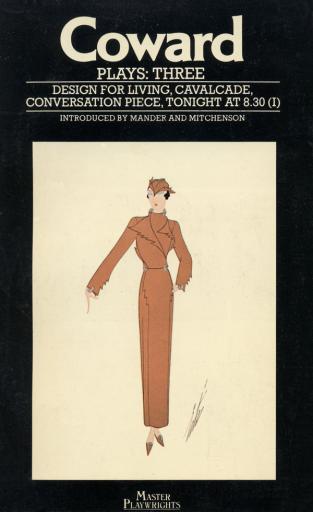Design for Living |
|||||||
|---|---|---|---|---|---|---|---|
| Primary Creator |
|
||||||
| Contributor(s) |
|
||||||
| Properties |
|
||||||
| Name of Work | Design for Living | ||||||
| Production Date | 1932 | ||||||
| Production Location |
|
||||||
| Current Location |
|
||||||
| Media Types | |||||||
| General Notes | See separate entry for filmed performances of this play, and the video clips in this entry. Note that as of 2008, there are at least two known video presentations available: The 1933 Ernst Lubitsch Hollywood version with Frederic March and Gary Cooper and Miriam Hopkins; and the 1979 BBC Philip Saville version with Rula Lenska, Clive Arrindell and John Steiner. Definitive playscript is published in "Play Parade" in 1933, but in modern printing as a softcover in "Noel Coward: Plays 3". | ||||||
Description
Portrayal of the intertwined love that two men and a woman feel for each other. They show a un-separatable deep emotional bond for each other. But the menage a trois suffers under the understandable psychological tensions of jealousy, since neither man wants to completely share Gilda with the other man, no matter how much the two men also share a platonic (?) love for each other. This conflict animates the plot and results in first Leo and Gilda living together with Otto leaving town, then Otto returning and Gilda taking up with him, so Leo leaves town. Then ultimately Gilda can't take the strain of choosing and leaves town with their platonic gallery-owning friend and marries him in the U.S. Eventually the two men (after their own affair?) come to NY and reunite with Gilda and come to make her realize that the real answer is for them all to live in happiness together.
Theme
You should follow your deepest values and accept them no matter how unconventional the outcome.
A rare combination of the wittiest, lightest of Noel Coward's style, along with deeper themes of romantic love, proper morality and how should one live.
Emotional Sum or Sense-of-life
Life can be giddy and bright. Facing up to one's anti-conventional values is important. Conventional morality must be questioned if it causes suffering and conflict.
Context Information
Tags

Discussion
- Log in to post comments
BBC ProductionI think that 70's production is quite successful for this difficult play. It is too easy to turn the characters into either watered-down eccentrics, or too-modern "liberated" multi-culturalists. The actual characters as shown in the playscript are better than such simplifications.